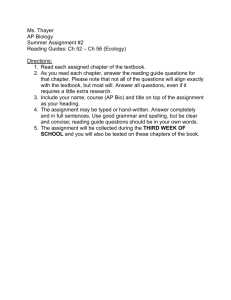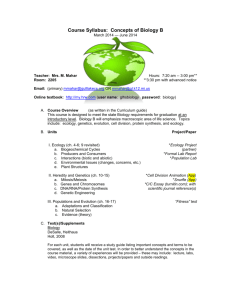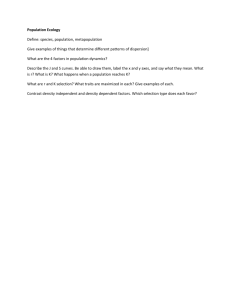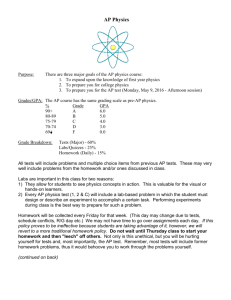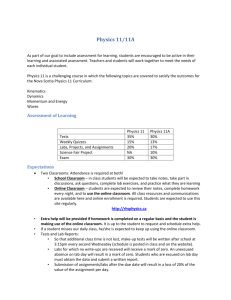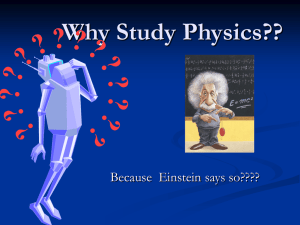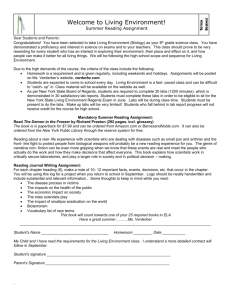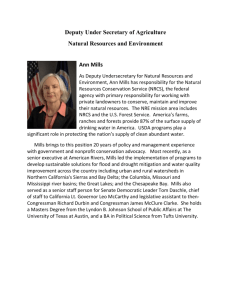Fall 2014 Professor Alex Mills BIOL 3170 3.0 – Population Ecology
advertisement
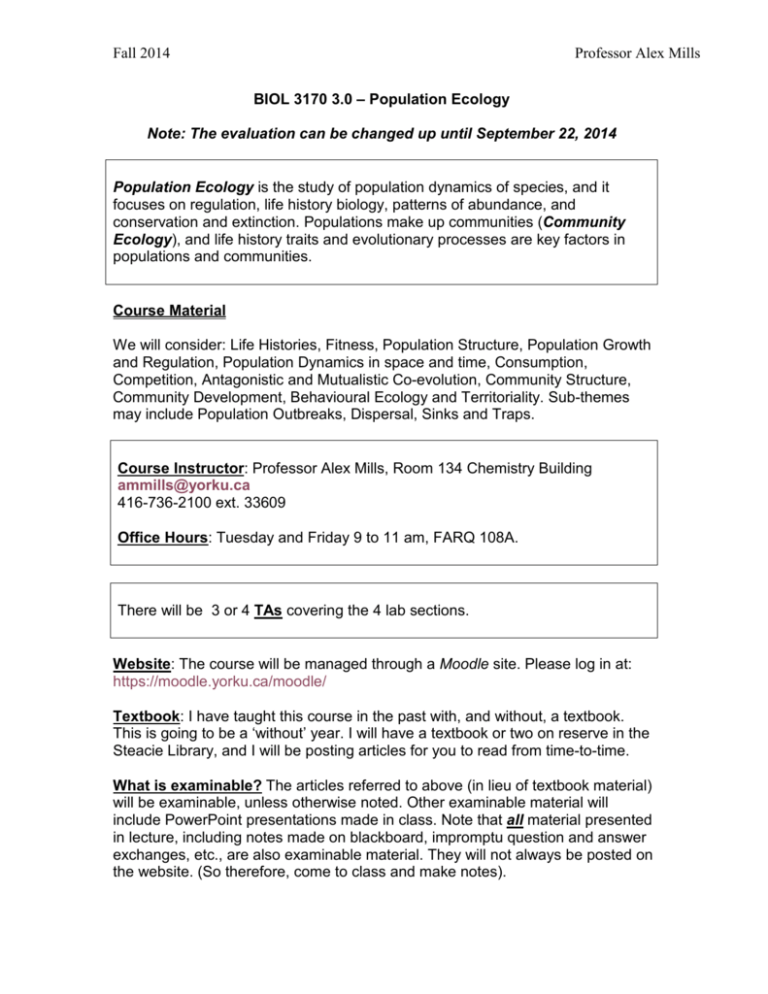
Fall 2014 Professor Alex Mills BIOL 3170 3.0 – Population Ecology Note: The evaluation can be changed up until September 22, 2014 Population Ecology is the study of population dynamics of species, and it focuses on regulation, life history biology, patterns of abundance, and conservation and extinction. Populations make up communities (Community Ecology), and life history traits and evolutionary processes are key factors in populations and communities. Course Material We will consider: Life Histories, Fitness, Population Structure, Population Growth and Regulation, Population Dynamics in space and time, Consumption, Competition, Antagonistic and Mutualistic Co-evolution, Community Structure, Community Development, Behavioural Ecology and Territoriality. Sub-themes may include Population Outbreaks, Dispersal, Sinks and Traps. Course Instructor: Professor Alex Mills, Room 134 Chemistry Building ammills@yorku.ca 416-736-2100 ext. 33609 Office Hours: Tuesday and Friday 9 to 11 am, FARQ 108A. There will be 3 or 4 TAs covering the 4 lab sections. Website: The course will be managed through a Moodle site. Please log in at: https://moodle.yorku.ca/moodle/ Textbook: I have taught this course in the past with, and without, a textbook. This is going to be a ‘without’ year. I will have a textbook or two on reserve in the Steacie Library, and I will be posting articles for you to read from time-to-time. What is examinable? The articles referred to above (in lieu of textbook material) will be examinable, unless otherwise noted. Other examinable material will include PowerPoint presentations made in class. Note that all material presented in lecture, including notes made on blackboard, impromptu question and answer exchanges, etc., are also examinable material. They will not always be posted on the website. (So therefore, come to class and make notes). Fall 2014 Professor Alex Mills Important Dates: First Class is Monday September 8th. Labs begin the week of September 15th. Last day to DROP the course without a grade being submitted is Nov 7th. Lab Schedule There are five projects that vary in terms of the amount of field work, the amount of time, and the work to be evaluated: Lab 1 – Sampling York’s Black-capped Chickadee population – PowerPoint presentation Lab 2 – The Goldenrod Gall Co-evolution lab – Worksheet Lab 3 – Computer Lab #1 – Simulation – Worksheet Lab 4 – Computer Lab #2 – Simulation – Worksheet Lab 5 – Investigating Community Structure – Poster Session Labs 1 and 2 will require visits to outdoor locations on campus—rain or shine! Dress with appropriate jackets, jeans, boots etc. If extreme weather prohibits a field trip, then an indoor lab exercise will be done instead. Students purchase Labs 3 and 4 for a nominal fee and download the labs on their own laptops or desktops (or on a USB key, if students don’t have their own computer). The goals of the labs are to conduct ecological field research to learn hands-on how population ecology and community ecology are done by ecologists and to learn how to write-up and present the results of your study using tools similar to those used by professional scientists. Attendance will be taken at labs and students should be prepared to provide legitimate doctor’s notes to explain absences. Students who choose not to attend the data analysis/writing labs (labs between compulsory lab activities) should not expect the TA to provide this information at any other time or by email. Fall 2014 Professor Alex Mills Some work involves groups; it is up to students working in groups to share the workload, meet internal deadlines, and check the quality of each other’s work. Will this Lab structure change? Perhaps. At the time of writing, the TA assignments have not been completed, and depending upon the TAs and their expertise and allotted hours, this could change during the first 2 weeks of September. Is there a required Lab Manual? No. Instructions will be posted on Moodle (but there will be a print-out for the computer labs). Evaluation: Labs Chickadee Lab Goldenrod Lab Computer Lab #1 Computer Lab #2 Community Structure Lab Midterm #1 Test (October 6) Midterm #2 Test (November 10) Exam (December exam period) 9% 6% 4% 4% 9% 20% 20% 28% A penalty of 20% per day will apply to all written material handed in late. After three business days, no late work will be accepted. BIOL 3170 Learning Objectives: Students will be able to… Area 1. Fundamental Understanding: Use terminology appropriate to the field of population ecology; Distinguish different models of growth; Recognize the main parameters and major formulae for describing population growth; Derive the formula and employ the formula for mark-recapture analysis; Distinguish between r- and K-selected traits and connect them to life history strategies and growth patterns; Demonstrate a knowledge of the effects of competition on population dynamics; Demonstrate a knowledge of the effects of predation on population dynamics; Demonstrate a knowledge of the effects of parasitism on population dynamics; Demonstrate a knowledge of the effects of mutualism on population dynamics; Apply the principles of population ecology to issues of conservation; Interpret population patterns in terms of evolutionary selective forces and evolutionary mechanisms applicable to small Fall 2014 Professor Alex Mills populations; Use natural history knowledge to understand population constraints Area 2. Critical Thinking Skills Employ case studies as exemplars of biological concepts; Draw generalized concepts from the results of particular scientific studies or experiments (inductive reasoning); Assess the effectiveness of experimental designs in answering questions about population dynamics; Predict population outcomes of hypothetical changes to the environments of on natural populations Area 3. Problem Solving Skills Apply principles from the scientific literature to new fact situations; Employ diverse field methods for collecting field data that is sought to address particular biological questions; Use mark-recapture parameters to estimate population sizes Area 4. Effective Communication On tests and exams, clearly construct written answers to questions and clearly construct written explanations or arguments for scenarios or fact situations; Create a conference-style poster to present a field project; Create and present an audio-visual talk designed to describe a field project Area 5. Work collaboratively with partners in collecting field data; Work with partners in creating and delivering an audio-visual presentation Please read these FAQs! Can I treat this course as a distance course? It is not designed as a distance course. It is not a course where you have to simply memorize material from a textbook or simply memorize PowerPoint slides! Some of the material will only be delivered during lecture. If you skip class, you will suffer accordingly, but that is up to you. Then what is “the whole course”? Material delivered during lecture (therefore take notes!), Text readings, PowerPoints posted on-line, and anything else indicated either in-class or on the course website. Then, of course, there are also the labs. Are study notes posted on-line? PowerPoints used in lecture are posted online. Commonly, I post a pre-lecture version and then a post-lecture version. Remember, these presentations do not constitute the whole course; they need to Fall 2014 Professor Alex Mills be understood in conjunction with what is said in class and what is read from the textbook. Can I surf the web while in class, or text friends, etc.? No! It is rude, and it is distracting to fellow students and to me. There is increasing research it is bad for student performance. Avoid temptation by turning off your phones and wireless. Classes are only 50 minutes, and your undivided attention is helpful to you and to me. If I miss a test or a lab, can I tell you when it suits me? No, please let me know by email within 24 hours, and submit documentation as soon as possible. Increasingly, course directors are applying a policy of no deferral agreements for missed Final Exams. I may implement this rule in some cases. (i.e. If you are ill and miss the Final Exam, you will have to arrange a deferred exam by submitting a petition). Do you bump marks at the end of the course? Very rarely; presume that a 79 is a 79, not an 80, and that a 59 is a 59, not a 60! Don’t aim for a 49! Accommodations: Students who feel that there are extenuating circumstances that may interfere with the successful completion of their exams or other course requirements are encouraged to discuss their concerns with Professor Mills as soon as possible. Students with physical, learning or psychiatric disabilities who require reasonable accommodations in teaching style or evaluation methods should discuss the matter with Professor Mills early in the term so that appropriate arrangements can be made. Religious Observance Days: Should any of the dates for tests or exams pose a conflict with a religious observance day for your particular religion, you must complete an Examination Accommodation Agreement Form (available online at Registrar’s Office site) and submit it to the instructor at least 3 weeks before the date of the test or 3 weeks before the start of the examination period. Academic Honesty: York students are required to maintain high standards of academic integrity and are expected to be familiar with and to follow the Senate Policy on Academic Fall 2014 Professor Alex Mills Honesty (see http://www.yorku.ca/secretariat/legislation/senate/acadhone.htm) Cheating and plagiarism are major academic offences and carry serious penalties, ranging from a failing grade on the work in question to expulsion from the university. Students should also complete the online tutorial available at that site. Professionalism and Student / Instructor Conduct: Students and instructors are expected to maintain a professional relationship characterized by courtesy and mutual respect and to refrain from actions disruptive to such a relationship and to the class. It is the responsibility of the instructor to maintain an appropriate academic atmosphere in the lecture hall, and the responsibility of the student to cooperate in that endeavour. Remember that texting, chatting, and surfing websites during lectures is unprofessional and disruptive. (Abuses may result in a no-laptop policy for all). I hope to make this course an enjoyable experience for everyone.
